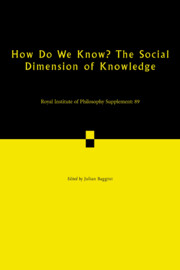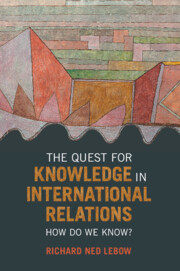How Do We Know? The Social Dimension of Knowledge
Knowledge is often thought of as something that we each individually have, something inside our own minds. But our knowledge depends on other people's testimony and expertise. And what we know depends on what our society makes it possible for us to know, either formally or informally through social norms and practices that suppress some ideas and privilege others. The philosophical study of the social dimension of knowledge is called Social Epistemology. This volume gathers experts in the field from across the world to give their perspectives on it.
- Contains contributions from experts in the field of epistemology, philosophy and psychology such as Jennifer Lackey,Paul Giladi and Danielle Petherbridge,with a preface from the new editor, Julian Baggini
- Covers a diverse range of topics, such as anger in public debate, medieval Islamic philosophy, and false confessions
- Accessibly written, this volume introduces the reader to the field of social epistemology, tracing the history of the social dimension of knowledge and how it has been affected by social norms and practices throughout history
Product details
July 2021Paperback
9781009077194
304 pages
228 × 151 × 13 mm
0.43kg
Available
Table of Contents
- Notes on the Contributors
- Preface 1. False confessions and subverted agency Jennifer Lackey
- 2. Rape myths: What are they and what can we do about them? Katharine Jenkins
- 3. 'To possess the power to speak' Linda Martín Alcoff
- 4. The predicament of patients Ian James Kidd and Havi Carel
- 5. How can you spot the experts? An essay in social epistemology Alvin I. Goldman
- 6. Received wisdom: The use of authority in Medieval Islamic philosophy Peter Adamson
- 7. Why do scientists lie? Liam Kofi Bright
- 8. Should we worry about silicone chip technology de-skilling us? Elizabeth Fricker
- 9. Passionate speech: On the uses and abuses of anger in public debate Alessandra Tanesini
- 10. The promise and pitfalls of online 'conversations' Sanford C. Goldberg
- 11. The vulnerable dynamics of discourse Paul Giladi and Danielle Petherbridge
- 12. The seductions of Clarity C. Thi Nguyen
- 13. How good are we at evaluating communicated information? Hugo Mercier
- 14. What is a question Lani Watson
- Index of names.




